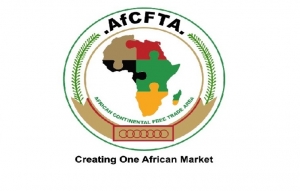Experts emphasize private sector’s role in unlocking AfCFTA benefits
The fundamental role of the private sector in accelerating the implementation of the African Continental Free Trade Area (AfCFTA) was highlighted at a high-level event jointly organized by the Economic Commission for Africa (ECA) and the Konrad Adenauer Stiftung (KAS) Office Ethiopia/AU.
ECA’s Deputy Executive Secretary, Mr. Antonio Pedro told more than 150 leaders of business, government, civil society as well as UN officials that the private sector is the backbone of production and trade, thus central to the AfCFTA’s success.
“The national AfCFTA implementation strategies being developed by several countries with the support of ECA, highlight the importance of inclusive implementation of the AfCFTA through improved private sector engagement, including Small and Medium Enterprises (SMEs) as well as women and youth,” the Deputy Executive Secretary added.
It would be recalled that the Chief Executive Officer, Pan African Payment and Settlement System (PAPSS) Afreximbank, Mike Ogbalu, had stated that African businesses lose over $5 billion every year to charges, payments and other related costs to intra-African trade barriers.
According to him, 80 per cent of payments that are destined for somewhere else on the continent, first of all has to travel somewhere else before getting to its final destination, saying this is the reason why intra-African trade is still low at 15 to 18 per cent.
He added that Africa trade more with rest of the world than it trades with itself.
Pedro also spoke about the AfCFTA Country Business Index (ACBI), which is the primary and innovative tool to capture private sector opinion on the implementation of the Agreement and provides useful information on trade challenges faced by women traders and small businesses.
Themed ‘the AfCFTA and Private Sector: Realizing Africa’s Full Potential,’ the high-level panel discussion was conceived in recognition of the private sector’s central role in promoting regional integration, cooperation and ensuring a successful implementation of the AfCFTA. This meeting was also an opportunity to evaluate progress in AfCFTA processes, and what may be needed from a private sector perspective in order to fully harness the AfCFTA.
In his keynote address, Ethiopian State Minister of Trade and Regional Integration, Endalew Mekonnen, citing the experience of Ethiopia said that his country is turning the page on decades of reliance on the state to drive economic growth and unleashing the potential of the private sector.

“Recent government reforms and incentives have created new investment and business opportunities to revitalize the economy by broadening the role of the private sector and to encourage private sector development in various fields including infrastructure,” Mr. Mekonnen underscored.
“We firmly believe that strengthening our trade relations within Africa through AfCFTA is very critical, not only because of the volume of trade but also in achieving the objective of Pan-African movement in the framework of creating a strong and united Africa,” the State Minister noted.
The Konrad-Adenauer-Stiftung Country Representative for Ethiopia/African Union, Benno Müchler said, “As a humble observer of Africa’s steps to a future in prosperity, I believe the AfCFTA holds the biggest promise for the citizens of Africa and its coming generations.”
Müchler went on to state that the German government is keen to strengthen trade relations between Africa and the world. As a German political foundation with more than 20 offices in Africa, KAS understands very well the importance of foreign direct investment, Africa’s economic potential and the many opportunities it has to offer.
He shared the hope that trade between Africa and the world under the AfCFTA will grow in a way that more value addition and job creation will happen on the continent.
Bringing the private sector on board on the last miles towards the AfCFTA will be crucial for its success. The private sector has its ears and eyes where the states have none,” Mr. Müchler added.
In the first panel discussion, moderated by Mr. Melaku Desta, Coordinator of the African Trade Policy Center (ATPC) of ECA, speakers highlighted the need for more work to be done to raise awareness of the details of the AfCFTA and how firms can participate. Participants also underlined the need for involving youth entrepreneurs in the negotiating process of AfCFTA instruments to ensure that their interests are taken on board. That will necessitate, according to participants, a major effort across African countries to translate the agreement into practical processes and procedures, and assist companies to use them.
Moderated by Mr. Benno Müchler from KAS, the second panel discussion focused on the comparative advantage and views from the private sector. Panellists thoroughly discussed the opportunities and challenges for the private sector, including the private sector in Germany, within the context of the AfCFTA. Participants recommended that Governments in collaboration with Private Sector should identify and address existing impediments to ensure the successful implementation of the AfCFTA. In addition, they discussed the need to strengthen the private sector’s capacity to enable them to discharge new mandates derived from AfCFTA.
Published By :- The Guardian [By Femi Adekoya]
Published On :- 27 June 2022


